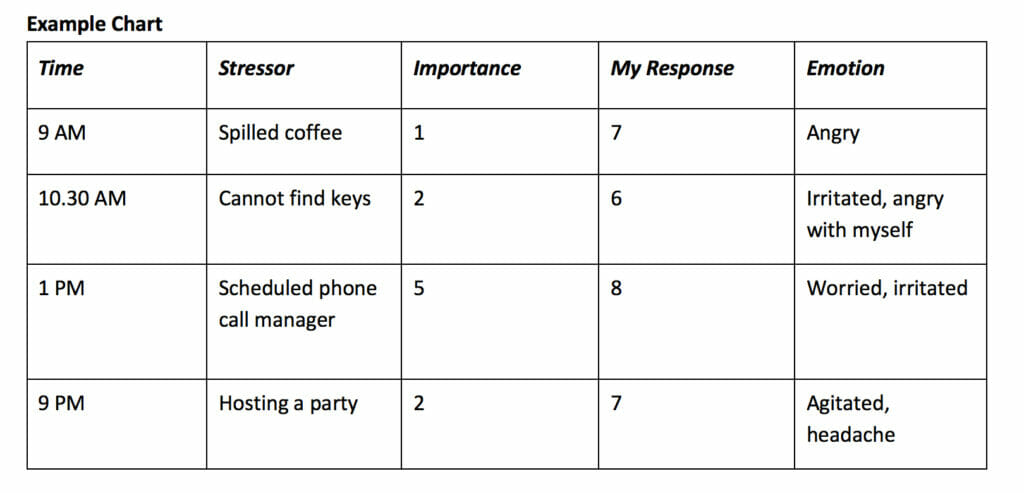
Life is stressful, especially now. Stress is a normal, human response. The goal of our stress response is to have us choose between two responses, fight or flight. A series of multiple physiological effects prepare us for a dangerous or threatening situation. When a threatening situation arises, adrenaline and cortisol are produced in the body to prepare us to take action. A stress response is useful when you have to make sudden decisions, especially in the sky. However, when the mind stays in this state due to other stress factors, the body remains in a state of heightened readiness. Continuous stress leads to chronic stress, which affects the immune system that can have negative consequences. This article offers exercises to help reduce and prevent stress.
One – Recognize Stress
First, it is important to understand how to recognize stress. Stress can manifest itself in physical, behavioral, cognitive, and/or emotional symptoms. These symptoms can be mild, with little effect on daily functioning, but can also be expressed more severely, hindering an enjoyable life. Recognizing and acknowledging the symptoms is the first step to help you better manage the stress. Some examples of symptoms of stress are:
Physical symptoms
- Rapid Heart Rate
- Aches and pains
- Low immune system
- Frequent illnesses
- Nausea
- Loss of sex drive
- Stomach ache
- Chest pain
Behavioral symptoms
- Changes in eating habits (eating more or less)
- Changes in sleeping habits (sleeping too much or too little)
- Social isolation
- Procrastinating
- Neglecting responsibilities
- Increase substance use (alcohol, cigarettes, drugs)
- Restlessness (nail-biting, speaking fast, pacing)
Cognitive symptoms
- Forgetfulness
- Difficulty concentrating
- Negative perspective
- Anxious/racing thoughts
- Worry
Emotional symptoms
- Depression
- Overwhelmedness
- Loneliness
- Agitation
- Anxiety
- Irritability
- Anger
Two – Find your Stressors
Consider the causes of these tensions. Have there been any major changes in your life recently? What are your worries? We often think that only negative events cause stress, but positive events can cause stress since they might require adjustments that cause tension. Review the stressors below to see if you have experienced or worried about any of the following life events within the past two years.
- Relationship issues (divorce, marriage, friends, family)
- Health problems/illnesses
- Change of job
- Unemployment
- Conflicts within your job
- Having a child
- Financial problems
- Buying a house
- Moving
- Home renovation
- Retirement
- Involvement in an accident
- Loss/grief (spouse, relative, friend)
- Illness of someone close to you
- Conflicts with children
- Concerns about your living situation
Three – Evaluate Stress
To better deal with daily tensions, it is crucial to gain insight and recognize moments that trigger stress and to ascertain if the amount of stress is proportional to the situation. Take notes on your stressors and emotions over the next two weeks.
After a stress-inducing event, gauge how stressful the experience was, rating the event between 0 (lowest) and 10 (highest). A 10 means that it caused a lot of stress; 0 did not cause tension at all. Behind the source of stress, rate the importance of this event between 0-10 as well. Major life events, such as having a child or losing a job, can be rated 10, spilling coffee earns a 1, for example. The next step is to evaluate if the stress you experienced is consistent with the importance of this situation? If you have an emotional outburst because you forgot to buy bread, your response is out of balance.

Four – Cherish Relationships
Studies show that social contact can help you relax and contributes to lower levels of stress. Make sure to invest in healthy and sustainable relationships. Spend quality time with your family, friends, and partner. Think about those who are important to you and come up with something to strengthen your relationships with them. Tell your father you love him, call a friend instead of texting, buy a big bunch of flowers for your aunt. It is priceless to have people around you who care, can listen to you and offer support when you need it.
Pro-tip: Gather people around you who have a good sense of humor and have the ability to put things into perspective by using humor.
Five – Exercise
Exercise is one of the easiest and most productive ways to reduce stress. Physical exercise is the natural outlet for a body that feels the fight-or-flight stimulus. Exercise removes chemicals that have been accumulated by stress. In addition, it helps the muscles to relax, increases your fitness, and boosts your immune system.
The most common challenges are to begin to exercise and to keep the habit. Choose a sport that you like or that contains elements that you enjoy. Start exploring what you like, for example, by joining a club or fitness center that offers free try-out classes. Give yourself a healthy reward each time you attend. Choose a form of exercise and promise yourself to go three times a week for two months. Follow up and reflect on how it is benefiting you, then decide after two months whether or not to continue.
- Running – Running is proven to combat depression by releasing positive hormones, such as endorphins. You can run whenever and wherever you want while getting fresh air and improving your overall fitness.
- Hiking and walking – Walking improves your mood, especially in a beautiful nature setting. It helps you to get your daily dose of Vitamin D and fresh air. Also, you can listen to your favorite music, podcast or use the time to reflect.
- Yoga – With many online classes available for every level, yoga is an excellent way to start your day mindfully. Yoga has many advantages. It is great for improving posture, muscle relaxation, and can be easily practiced in a hotel room without equipment.
Six – Bring Down Screen Time
Throughout the day, we are often occupied with the screens of our phones, televisions, computers, and tablets. Become aware of your screen time. Schedule downtime from your devices. During dinner, turn off the television and focus on conversation. Invest in headphones to keep your hands free to fulfill other tasks while talking on the phone. Use voicemail. Try not to answer the phone, check social media or reply to texts after a given hour, maybe 10pm.
Pro-tip: Take a social media break. Delete social media apps from your phone and log out from accounts on tablets and laptops; they can be reinstalled anytime. Start a social media fast for a day, build up to a week or even a month. It is less difficult than you might expect and can save a lot of time and energy for other activities.
Seven – Train your Brain
Do you become irrationally angry when a fellow crew member makes an honest mistake that slightly inconveniences you? Do you start swearing at another driver when they unexpectedly change lanes on the highway? Anger is a useful emotion, but it is counterproductive if anger is triggered by relatively small frustrations. Research shows that hostile people have a shorter life expectancy than friendlier people. The consequence of the stress is greater risk for cardiovascular disease with links to a higher probability of substance use and overeating. Developing skills for anger management can help. A technique to train your brain to deal more effectively with frustration is called “paradoxical intention” – a psychological intervention used to overcome the resistance to change. In other words, when you feel anger coming up, do the exact opposite of what you want to do. When you’re having trouble falling asleep, focus on staying awake. Focusing on staying awake allows you to forget how difficult it is to fall asleep and is proven to help you fall asleep sooner.
Examples of paradoxical intentions
- If you join a long line in the supermarket and feelings of frustration are coming up, next time, intentionally join a longer line.
- When walking, consciously wait for the walk signal, even if there is no one else around.
- If you are in traffic in a slow lane on the highway, keep driving the whole way in the right lane.
- In a restaurant, wait without waving the waiter down or if you’re feeling pressured to order, ask for more time to examine the menu.
Eight – Schedule Breaks
Scheduling ahead can save a lot of time. The key to effective time management is not planning too much and most importantly, scheduling time for yourself. Prioritize time for yourself as highly as other obligations and commitments. Write down a schedule for the next day. Estimate the time required for each of your activities and establish time limits. Plan demanding tasks for times of the day when you are most productive and alternate demanding tasks with those that are less demanding. Keep a time buffer of 50 percent for unexpected delays so that you won’t become frustrated by setbacks. (And when you don’t use all the buffer time, you’ll feel ahead of schedule which is highly satisfying and a stress reducer.) Set time to relax and try to set boundaries when you do not want to be disturbed.
Implementing these exercises into your lifestyle will help mitigate the stress that builds in your everyday life. Once your chronic stress level is reduced, you’ll enjoy better mood and health. Plus, when you are faced with a genuinely stressful situation, you will be better prepared to receive the help your body can give to confront the situation and receive the positive benefits of the stress response. Train yourself to be cool, calm and collected ¬– traits viewed as admirable and beneficial when a critical stressor presents itself.



























































































































